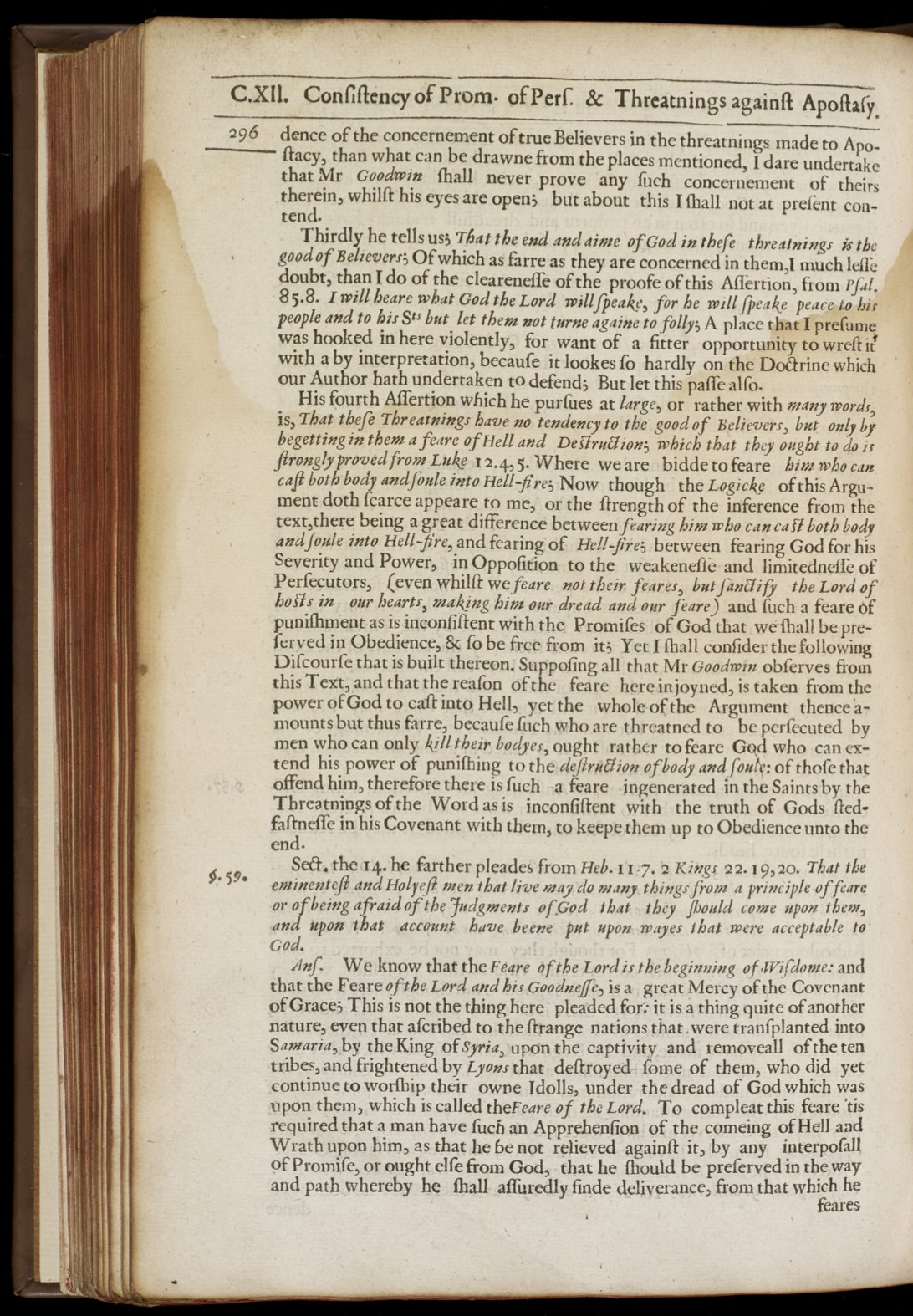

C.X[l.
Conf
fténcy
of
Prom.
ofPerf
&
Threatnings
againft
Apoflafy,
296
dente
of
the concernement
of
true
Believers in
the threatni
rigs
made
to
Apo
-
flacy, than what can be
drawne
from the
places
mentioned,
I
dare
undertake
that
Mr
Goodwin {hall
never
prove
any
fuch
concernement
of' theirs
therein,
whilft his
eyes
are open; but about
this
I fhall
not
at
prefent
con-
tend.
Thirdly
he tells us; That the
end
and
aime
of
God
in
thefe
threatnings
is
the
good
of
Believers;
Of
which
as
farre
as
they are concerned
in
them,I much
leffe
doubt,
than I do
of
the
cleareneffe
of
the
proofe
of
this Aflèrtion, from rfal.
85.8.
I
will
bare
what
God the
Lord willfpeake,
for
he
will
fpeake
peace to
his
people
and
to
his
Sts
but let them not turne
againe to folly; A
place
that
I prefume
was
hooked
in
here violently, for want
of
a
fitter opportunity
to
wren
it
with
a by
interpretation,
becaufe it lookes
fo
hardly on the Doctrine
which
our Author
hath
undertaken
to
defend;
But
let
this
paffe alfo.
His
fourth
Affertion which
he purfues
at
large,
or
rather
with
many
words,
is, That
thefe
Threatnings
have
no
tendency to
the
good
of
Believers, but
only by
begetting
in
them
a
feare
of
Hell
and Deilrultion;
which
that
they
ought
to do
it
flrongly proved
from
Luke
12.4,
5.
Where
we are
bidde to
feare
him
who
can
call'
both
body
andföule
into
Hell
-fire;
Now though the
Logicke
of
this
Argu-
ment doth
Ccarce
appeare
to
me,
or the flrength
of
the
inference from
the
text,there
being
a
great
difference betweenfearing
him
who
can
rail
both
body
and
foule into
Hellfire,
and fearing
of
Hell-fire;
between fearing God for
his
Severity and
Power,
in
Oppofition
to the
weakeneffè
and
limitedneffe
of
Perfecutors, (even
whilft
we
feare
not
their fearer,
but
fànfli
fy
the Lord
of
ho.Flr
in
our
hearts, making him our
dread and
our
feare)
and
fuch
a
feare
df
punifhment
as
is
incontinent with the
Promifes
of
God
that
we
fhall
be
pre-
ferved in Obedience,
&
Co
be
free
from
it;
Yet
I
Ihall
confider
the
following
Difcourfe
that
is
built thereon.
Suppofing
all
that
Mr
Goodwin
obferves
from
this
Text, and that
the
reafon
ofthe
feare
here injoyned,
is
taken
from the
power
of
God
to
caft
into,
Hell, yet
the
whole
of
the
Argument thence
'a-
mounts
but
thus
firm,
becaufe
Inch
who are
threatned
to
be perfecuted
by
men
who
can
only kill their
bodyes,
ought rather to
feare
God
who can ex-
tend
his
power
of punning
to
the
deflrue
/ion
of
body
and
fou:
of
thofe that
offend him,
therefore there
is
fuch
a feare
.
ingenerated
in
the
Saints
by the
Threatnings
of
the
Word
as
is
incontinent with
the
truth of
Gods
fled-
faflneffe in
his
Covenant with them, to
keepe
them up to
Obedience unto
the
end.
4.59
Se& the
14.
he
farther
pleades from
Heb.
Ix.
7.
2
Kings 22.
79,20.
That
the
eminentefli
and
Holyeff
men
that
live
may
do
many
things
from
a principle
of
feare
or
o
f
being
afraid
of
the
fudgments ofGod
that
they
fhould
come upon
them,
and
upon
that
account have
been
put
upon
wayes
that
were acceptable to
God.
Anf.
We
know
that
the
Feare
of
the
Lord
is the beginning
of
.wi
fdome:
and
that
the Feare
ofthe
Lord and
hisGoodnefé, is
a
great
Mercy
of
the
Covenant
of
Grace; This
is
not the
thing
here
pleaded for it
is a
thing quite ofanother
nature,
even
that
afcribed
to the
flrange nations
that
were tranfplanted into
Samaria,
by the
King
of
Syria,
upon
the
captivity_
and
retnoveail
ofthe
ten
tribes, and frightened by
Lyons
that
deftroyed-
Come
of
them,
who did yet
continue
to
worthip
their
owne Idolls,
under the
dread
of
God which
was
upon them,
which
is
called theFeare
of
the Lord.
To
compleat
this feare
'tis
required that
a
man have
fuch
an Apprehenfion
of
the
comeing
of
Hell
and
Wrath
upon
him,
as
that
he be not relieved againft
it,
by
any interpolall
of
Promife,
or ought
elfe
from
God,
that
he fhould be preferved
in
the
way
and path whereby he
fhall
affuredly finde deliverance,
from that
which he
fearer










